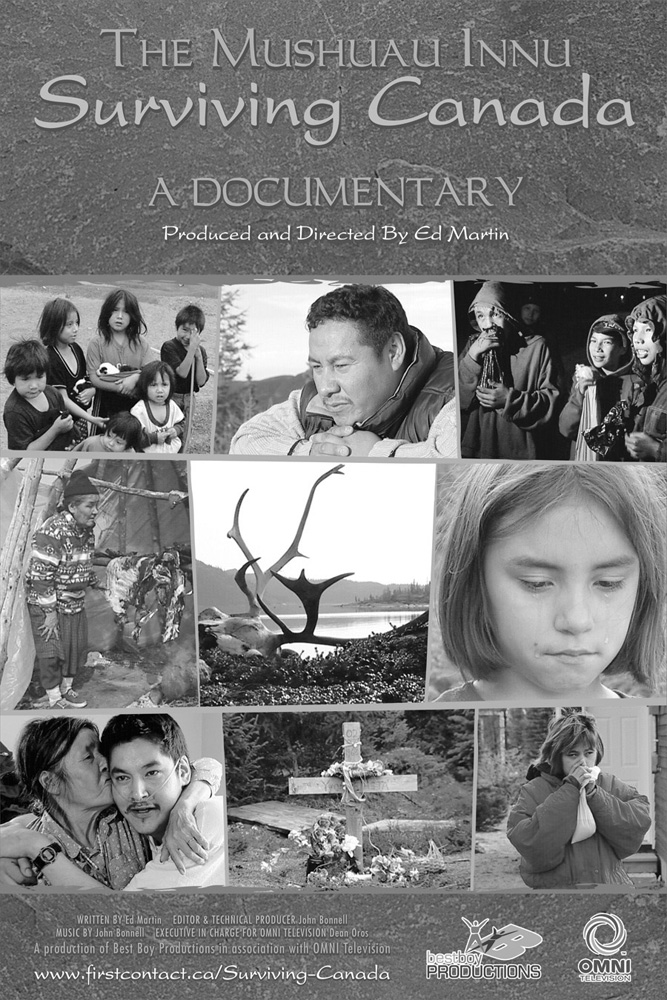
The Mushuau Innu – Surviving Canada is a documentary written, produced and directed by Ed Martin about the appalling tragedy of the Labrador Innu. Canada, a country that much of the world views as one of the best places to live, is, in fact, where cultural genocide is still taking place… and barely anyone notices. The slow death of the Innu people and their culture is the direct fruit of government policy; a sad tale of a proud Nation..
After having lived nomadic lives in the tundra of Labrador for 6,000 years, the Innu are the last Aboriginal people in Canada to be forced to live in settlements and learn non-Innu language and religion.
“Strong hunters, roaming free, they were highly successful and independent people,” Martin narrates in his film. The best way for the government to control the nomadic Innu was to round them up in 1967 on an island, the infamous Davis Inlet, with promises of a paradise. With the help of the Church, which stripped them of their beliefs and sexually abused some, the government decided to assimilate the Innu into the white world. They were built sub-standard housing without the promised running water and sewage system. Ironically, the school, the priest’s house and the RCMP did have running water.
Instead of successful assimilation Canada left the Innu in a place without any social structures or resources. A place where they could no longer hunt, a place where their culture faded away and their hope died.
“As their sense of worth disintegrated, they engaged in self-destructive behavior,” Martin observes. “Ninety per cent became alcoholic, many children sniff gas, violence is rampant. They are killing themselves at a rate among the world’s highest.”
The federal government does not a thing to help the children, they have not provided any social or health services even after all the pleas. Only promises, again. How can this be allowed? It says a lot about our white society and our government and it is shameful.
With a stroke of the pen, when Newfoundland joined the constitution in 1949, the Innu were excluded from the Indian Act. A report from the Human Rights Commission in 1993 stated that the federal government had failed the constitutional rights of the Innu for more than 50 years. It took 10 years from that report date for the government to relocate the 700 residents to Natuashish, where new houses, running water and sewage were in place. It became evident in a few months that the problems moved as well and became even worse. Today 35 per cent of Innu schoolchildren suffer from fetal alcohol syndrome. Many children drop out as early as primary school due to an education system that does not relate to the Innu way of life. Something needs to be done before the last Innu kills himself. The rate of attempted suicide now is between 10 and 12 per month and since July 2004, four have succeeded.
The learning curve of the federal government is critically deficient. It has not learned from all other tragedies of Canada’s First Nation people. Bullying a people and changing their way of live simply kills the human spirit. Running water and toilets do not heal the wounds. If the government wants to do right by the Innu, it has to save and protect the youth, the generation yet spared by drugs and alcohol, and provide all necessary social resources to help the Innu live in a strong and healthy society. The Innu are ready and willing to move ahead, but their major obstacle is the federal government. The time has come for Canada to take responsibilities and walk the talk, to show the Innu people that their existence matters, that they are not animals.
Ed Martin’s film shakes us into awareness. It gives us an honest, straightforward story that everyone ought to see. Martin voices what so many white people think: “I have a hard time coming to grips with the fact that we have done this to yet another group of people, yet I am at a loss to know as to how we can now contribute to making it better.” He spoke to Innu leaders, doctors, anthropologists and former government bureaucrats for the film. He did not speak to anyone from Health Canada or Indian and Northern Affairs, as both declined interview requests. To gain knowledge on this topic please visit the website at “http://www.firstcontact.ca/ Surviving-Canada” www.firstcontact.ca/ Surviving-Canada
This Best Boy Productions documentary will air on CBC Newsworld in January 2005.

